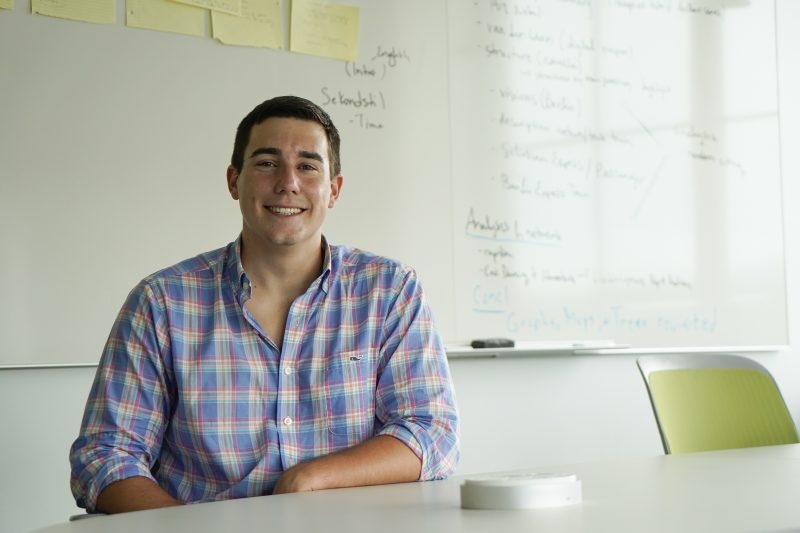The Railway in German Literature Ben Schaeffer '18 is working with German professor Paul Youngman on a project involving references to the railway in German literature.
“The German, Russian and Arabic Department at W&L has fantastic instructors who motivate the students and encourage us to dig deeper and learn more.”
— Ben Schaeffer ’18
Hometown: Shelby, North Carolina
Majors: Global Politics and German
Q: What are you doing for the summer?
I’m working with German Professor Paul Youngman on a digital humanities project. We’re looking at German realist literature, specifically texts that frequently mention or utilize the railway. For me, it is a 10-week summer research project, but Professor Youngman has been working on this for several years now.
I’m working on campus in Leyburn Library and the Center for Global Learning, but we will go to a conference in Montreal in early August.
Q: What does an average day for you look like?
It depends on whether I’m meeting with Professor Youngman. On reading days, I go over the text, annotate appropriately and begin preliminary research on a specific location or train route. On meeting days, Professor Youngman and I discuss the text and themes. We then take this new information and try to make sense of it as it relates to the rest of the project: Is it useful, or does it disprove our hypothesis? What additional information do we need? Then we will go from there.
Q: What is the most interesting thing you have learned while working on this project?
Professor Youngman and I were submitting a paper for publication in a journal, and they did not want two spaces after every period, the way the paper had been written. I did a quick Google search and realized you could simply “Find and Replace” every instance of the double space with a single space. That saved us hours of going through every single sentence and deleting the extra space.
Q: What was the biggest challenge you faced?
So far, the biggest problem is finding information. Our first author of the summer, Arthur Achleitner, is unknown outside of southern Germany and there has been very little scholarship about him. We need to know more about his background, writing styles and inspirations, and unfortunately, we have not found too much on him.
Q: Have you had any mentors during this time?
I consider Paul a mentor. He was one of the first people I met at W&L. As a first-year student, I took a Spring Term course in Berlin with him, and since then he’s served as an integral mentor and instructor.
Q: Has this experience impacted your studies or future plans in any way?
I’ve talked with Professor Youngman about possibly doing an independent research project that would utilize digital humanities skills and technologies.
Q: How did W&L prepare you for this experience?
The German, Russian and Arabic Department at W&L has fantastic instructors who motivate the students and encourage us to dig deeper and learn more. Our classes rely heavily on participation, and the relationships between professors and students is invaluable.
Q: Why is this kind of experience important to W&L students?
Summer research through W&L is another example of the university’s commitment to its students. This is an excellent opportunity for any student to learn more about an academic field and be an active participant in the research process without having to worry about coursework or co-curricular activities.
If you know any W&L students who would be great profile subjects, tell us about them! Nominate them for a web profile.
 Ben Schaeffer
Ben Schaeffer
You must be logged in to post a comment.